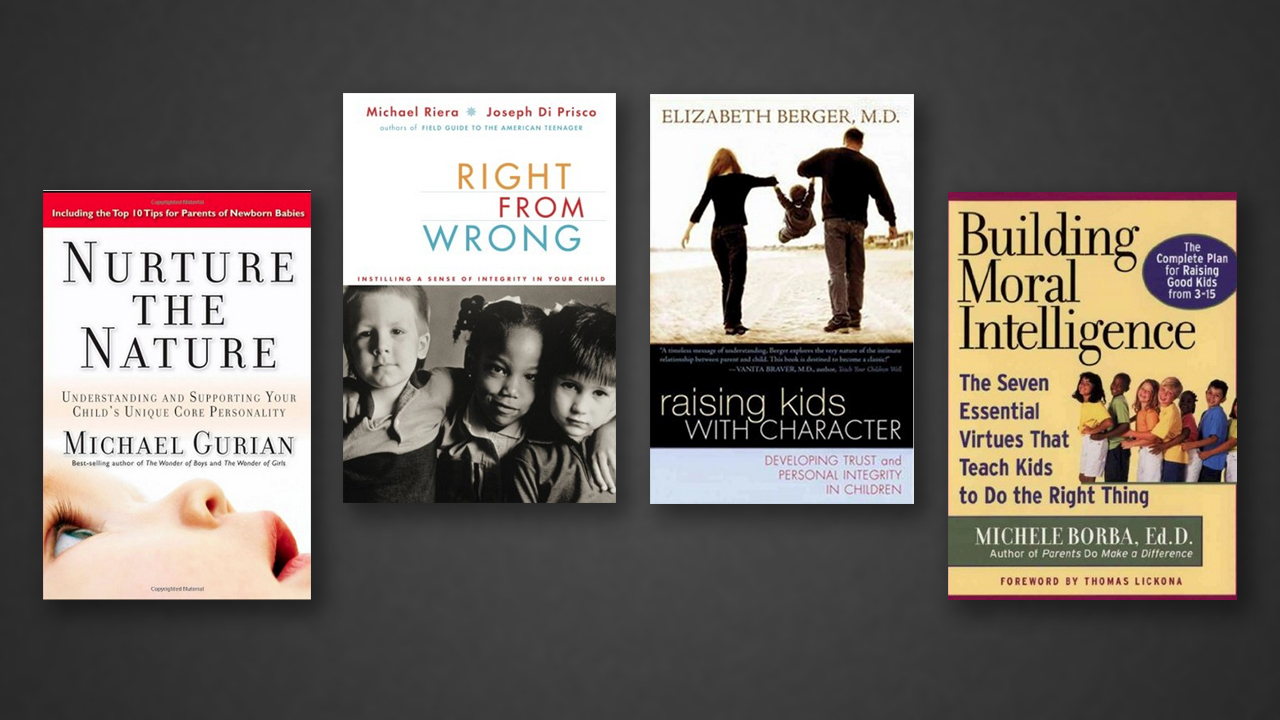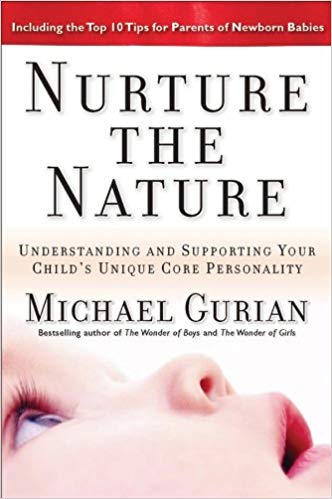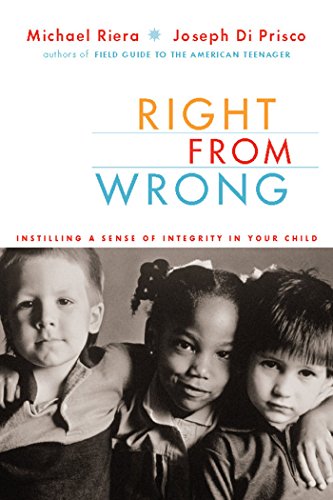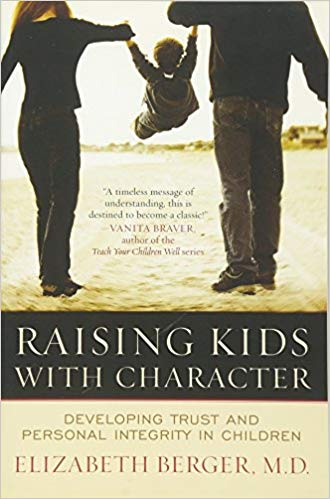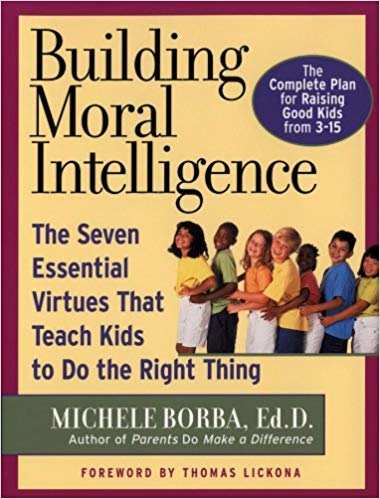Child Rearing: Off to Nurturing School
Nurture the Nature: Understanding and Supporting Your Child’s Unique Core Personality
Michael Gurian. 2007. John Wiley & Sons, Jossey-Bass, San Francisco. 368 pages.
Right From Wrong: Instilling a Sense of Integrity in Your Child
Michael Riera and Joseph Di Prisco. 2002. Perseus, Cambridge, Massachusetts. 256 pages.
Raising Kids with Character: Developing Trust and Personal Integrity in Children
Elizabeth Berger. 1999, 2004. Rowman & Littlefield Publishers, Inc., Lanham, Maryland. 248 pages.
Building Moral Intelligence: The Seven Essential Virtues That Teach Kids to Do the Right Thing
Michele Borba. 2001. John Wiley & Sons, Jossey-Bass, San Francisco. 336 pages.
Most parents desperately want the best for their children, yet a clear vision of what constitutes “the best” is hard to come by. Parental goals for their progeny might include longevity, financial success, fame or intellectual brilliance. Some might use a general term such as happiness to describe what they want for their children. Others may have a more explicit goal in mind; “My child is going to be the next Tiger Woods,” for example. Whatever the objectives, bookstore shelves bulge with advice to help parents achieve them. And parents take this advice. Too much of it, Michael Gurian believes.
Bombarded by sometimes conflicting advice from popular child-rearing gurus, parents throw what they hope are mind-expanding, success-ensuring programs at their children, to the point that children may become overstressed and overstimulated by the constant activity. Even from birth, babies are subjected to the latest enrichment fads: exposure to the “right” music, or to toys and mobiles sporting the right brain-boosting color combinations. Many parents fall for assurances that neglecting such advice is perilous to their child’s future, so they find themselves trying frantically and unsuccessfully to apply everything they hear—often at tremendous expense to the family’s coffers and the child’s peace of mind.
Family therapist Gurian calls this method of parenting “the social trends parenting system.” In his latest book, Nurture the Nature: Understanding and Supporting Your Child’s Unique Core Personality, he denounces the “media- and society-driven system of raising kids that takes the locus of control for child-raising away from the parents’ instincts about their own children’s nature and puts it in the middle of constantly changing social fads, experts, and infotainments.” In place of society’s cookie-cutter approach, which he views as a result of the industrial revolution’s assembly-line mentality, he suggests a more tailored one.
Gurian believes that when parents take the time to understand each child’s individual nature—his or her weaknesses, strengths and potential—they can set better behavioral boundaries for their children and provide the right kinds of stimulation in the right doses. “As we see our child’s young core nature flourish imaginatively, in nature, in purpose and responsibility, and in a reasonable schedule with reasonable material objects in tow,” he says, “we can feel a calm in our home and a deeper sense of purpose ourselves.”
But how do we go about discovering our child’s individual nature? Gurian points out that some aspects of a child’s core nature are dictated by personality and temperament, while others are dictated by gender. For example, gender science is now able to provide parents with confirmation that the brain of a ten-year-old boy is wired for physical activity to a much greater degree than the brain of a girl the same age. Hers, in contrast, is wired more strongly for attention to relationships. With this kind of information in their arsenal, parents can better decipher how best to address their children’s weaknesses and strengths, with the goal of helping them develop meaning and purpose in their lives.
According to Gurian, “a child’s individual core nature finds meaning through responsibility. A child ‘means something’ because he or she must act meaningfully. A sense of purpose in the child and then the adult comes from small seeds of purposeful action.” In other words, by requiring our children to take responsibility through their actions and for their actions, we help them come to some appreciation of why they are alive. Conversely, Gurian believes a child’s “natural search for meaning and purpose” can be distracted by a frivolous abundance of material possessions and activities that have been accumulated without relevance to the child’s hard work or self-development.
Gurian then offers practical advice broken down by age group to help parents nurture this need for meaning and purpose throughout their children’s lives. While one of his stated governing principles is that “character and moral development, as well as spiritual reflection and moments of joy, are crucial for fully developing the nature of each child,” that is the only time the terms character and moral development actually appear in the text. Much of the advice in his book may result in the effective building of character and the development of a moral intelligence, but Gurian’s statement still leaves one looking for further elucidation of these concepts. Then again, perhaps they have enough depth to warrant separate treatment in another book.
Defining the Issues?
Unfortunately, few books published since 2000 have anything of real value to say about these subjects. Some recent offerings in the field of character building and moral development in children include Michael Riera and Joseph Di Prisco’s Right From Wrong and Elizabeth Berger’s Raising Kids With Character. However, neither treatment lives up to the expectations raised by its title.
Educators Riera and Di Prisco, who never quite manage to define right and wrong, advocate telling children “untruths” under the “right” circumstances, and prefer the term integrity to anything like character or morality. By integrity the authors say they mean “a whole person . . . undivided,” and they excuse their avoidance of the term morality on the basis that “true self-esteem and character and morality are predicated upon integrity.” But based on their definition of integrity, there may be a flaw in this argument. How does one build wholeness without a set of standards to define what will comprise that wholeness; or how does one choose which parts of one’s nature to nurture or reject without an idea of which inclinations are right and which are wrong? It would seem that character and morality must be an integral part of any attempt at creating wholeness.
While Riera and Di Prisco have latched on to one accepted usage, the Stanford Encyclopedia of Philosophy cautions that using integrity as a term of virtue is risky business: “Ordinary discourse about integrity involves two fundamental intuitions: first, that integrity is primarily a formal relation one has to oneself, or between parts or aspects of one’s self; and second, that integrity is connected in an important way to acting morally. . . . How these two intuitions can be incorporated into a consistent theory of integrity is not obvious, and most accounts of integrity tend to focus on one of these intuitions to the detriment of the other.”
This certainly seems to be the case in Right From Wrong: in emphasizing “wholeness” over morality in their definition of integrity, the authors risk the implication that immoral persons may, in fact, be considered to have integrity. A Hitler, by such a definition, could be considered a person of integrity as long as he is “confident in the knowledge that he or she is living rightly,” as Riera and Di Prisco require. Would Hitler have believed himself to be living wrongly? Did he not act consistently, with undivided commitment to his inner self? As the Stanford Encyclopedia of Philosophy also notes, “one may acknowledge a person to have integrity even though that person may hold importantly mistaken moral views” (emphasis added).
The conclusion of the whole matter for Riera and Di Prisco can be taken from their final paragraph: “It was Augustine [of Hippo, 354–430] who slyly said, ‘Love God and do whatever you want.’ We would secularize and adapt his wisdom for our purposes: ‘Be in integrity and do whatever you want.’ This is the most solid peg in the world upon which to hang our hat. . . .”
Some parents may not find that peg quite solid enough, however, and may be sorely tempted to toss this effort into Michael Gurian’s bin marked “Social Trends Parenting Books.” If so, it may shortly afterward be followed by child psychiatrist Elizabeth Berger’s Raising Kids With Character.
Berger’s use of the word character may take the reader one step closer to solid ground than Riera and Di Prisco’s use of integrity, but her approach to teaching the concept leaves the reader feeling just as bereft of substantive help—though never starved for sentimentality. Raising Kids With Character does have some nuggets of wisdom to offer, but one must pan saccharine streams and wade through muddy concepts to find them.
From Fuzzy Notions to Concrete Strategies
Fortunately, those who are inclined to compare Berger’s advice to a more sensible guide can still obtain Michele Borba’s 2001 book, Building Moral Intelligence: The Seven Essential Virtues That Teach Kids to Do the Right Thing.
Like Berger, Borba acknowledges that moral character in children comes about with a healthy dose of parental love. Unlike Berger, Borba believes that character must also be actively taught. She notes that when it is not, children end up with “flimsy consciences, poor impulse control, underdeveloped moral sensitivity, and misguided beliefs.” The good news, she says, is that “moral intelligence is learned, and you can start building it when your kids are toddlers.” Borba, a child development expert and education consultant, then sets about dispensing straightforward, no-nonsense advice about how to teach it.
Her firm grasp on reality contrasts sharply with Berger’s fuzzier notion that children learn such things as character and speech, “not because they are taught, but because they are loved.” In passive language Berger opines that “infants already have inside just what they will need . . . to master the world around them, and in time to master themselves, so long as they are cherished and protected from harm in all the ordinary ways.”
“Indeed,” she offers, “most childish errors need no particular correction.”
“As parents and teachers, we can no longer sit back and hope our kids become caring and decent human beings. Too many societal influences are endangering our children’s moral growth.”
In contrast, Borba’s voice is no whisper from the clouds but an intelligible call emanating steadily from terra firma. Stressing the importance of unconditional love, she adds realistically, “In some cases, when our kids’ actions are inappropriate, we may need to respond with clear and sometimes passionate correction.” Awake to the realities that face parents, Borba explains: “As parents and teachers, we can no longer sit back and hope our kids become caring and decent human beings. Too many societal influences are endangering our children’s moral growth. . . . Deliberately teaching [the seven essential] virtues at home, at school, and in our communities is the best assurance we have that our kids will lead decent, moral lives.”
By comparison, Berger’s tone is almost dreamy: “Parents need not teach children to wait,” she assures her readers; “life does this by making children wait until they are adults for much of what they desire.” Raising Kids With Character ends with what might be described as a psychedelic commentary: “In the great river of life, our love . . . is our real immortality. . . . In this way, our love for our children becomes the child himself and his children and his children’s children. This can be part of our answer to the child who asks, ‘What happens to us when we die?’ We can reassure this child, and reassure ourselves if we ever doubted it, that each human being has the opportunity to participate in the deepest and most eternal mystery there is—the human heart.” That is not, unfortunately, the only mystery Berger leaves her readers pondering.
Borba, on the other hand, does not waste time pondering mysteries. Her doctorate is in the field of education, and this shows in her precise wording and crisply organized structure. Following through with confidence on the title’s promise, she promptly presents the seven essential virtues that she believes children must be taught: empathy, conscience, self-control, respect, kindness, tolerance and fairness. “These are the core traits that will help your child become a decent, good human being.” She proposes that “they are the bedrock of solid character and strong citizenship, and they are ones we want most for our kids.”
“Respect is the virtue that enforces the Golden Rule; when we treat others the way we would like to be treated, it helps make the world a more moral place.”
Neither does she equivocate with wishy-washy definitions. “Moral intelligence is the capacity to understand right from wrong; it means to have strong ethical convictions and to act on them so that one behaves in the right and honorable way.” She doesn’t waver from this stance, even when she defines the virtue tolerance. “Tolerance does not require that we suspend moral judgment,” she clarifies. “Tolerance enables us to agree to disagree about even the most controversial of issues; it enables us to live with our deepest differences even as we continue to debate them.” Borba follows up her definition with concrete strategies to actively teach this kind of tolerance to children.
What is the biggest challenge parents face in teaching tolerance—or any of the other virtues? Borba believes it is to combat cultural influences that increasingly bombard children. As one would expect, these include noxious messages that reach children through all types of popular media, often without being buffered by the influence of adult supervision. But Borba further suggests that “anyone or anything that counters your family’s moral convictions is a potential threat, so add peers, other adults, and even the evening news to your list.” Of course, as a child’s foremost instructor and influence, parents must also consider that their own example is of primary importance—a truism that this former classroom teacher readily acknowledges.
While she doesn’t expect parents to be able to protect their children from all negative cultural influences, Borba ably convinces her readers that when parents take an active role in teaching moral principles, children develop an inner sense of right and wrong that enables them to stand on their own in the face of negative pressures.
“Very interesting scientific-based research has shown that children who go through religious activities during childhood do better in life. . . . It is important right now that you ask yourself questions about how you want to be tuned into this area of your child’s core nature.”
How does a parent do this? Borba has many practical suggestions, among them the following:
- Talk about your moral standards with your children—and do it often. Researchers who study the major factors that encourage ethical behavior in children call this “direct moral teaching.”
- Expect moral behaviors. In fact, don’t be afraid to demand them. High but reachable expectations that parents don’t back down from produce amazing results, especially when parents themselves live by them.
- Question your children and apply a moral perspective to your questioning. They should have no doubt about the principles that are foundational to your parenting.
Borba goes a long way toward bridging the gap Gurian has left, even if purposely, in his treatment of morality. If she is missing an important consideration that Gurian supplies, it is the concept of inculcating a sense of meaning and purpose in children. Some parents, of course, see meaning and purpose as motivators that can arise only at the end of a child’s maturation—and this might be true if meaning and purpose relate solely to what one wants to do for a living after reaching adulthood.
But surely, as Gurian hints, there must be a broader sense of inner purpose that is vital to nurturing moral intelligence. Perhaps there is even an underlying life meaning that could be instilled almost from infancy, one that’s important enough to give a child the confidence and motivation to become a partner in the parents’ efforts to nurture his or her best nature and moral intelligence. Nevertheless, it must be acknowledged that the approaches taken by Gurian and Borba have the potential to complement one another beautifully and provide parents with an invaluable tool for developing children to their highest individual human potential, and for the greater overall good of society.
And isn’t this, in the end, what parents really want for their children?

